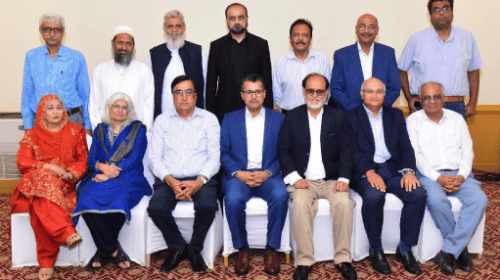Karachi
In a major development for environmental protection in Sindh, the Sindh Environmental Protection Agency (SEPA) is set to unveil a comprehensive strategy aimed at combating marine pollution along Karachi’s coastal belt. The initiative will seek to safeguard marine life and coastal areas from the ongoing damage caused by the unchecked discharge of domestic and industrial effluents.
The newly appointed Director General of SEPA, Waqar Hussain Phulpoto, made this announcement while addressing a roundtable discussion on environmental governance in Sindh, organised by the National Forum for Environment and Health (NFEH) at a local hotel.
Phulpoto acknowledged the growing threat of marine and coastal erosion due to effluent discharge from industries, residential areas, and the port. He emphasised that under his leadership, SEPA is considering the establishment of a dedicated marine pollution control cell and the deployment of trained personnel to proactively mitigate coastal environmental degradation.
“The issue of marine pollution involves multiple stakeholders,” he noted. “SEPA will factor in the jurisdictional overlap between various civic, land-owning, and municipal bodies — including the Karachi Metropolitan Corporation, which controls only a limited portion of the city, which often hinders environmental law enforcement.”
Phulpoto reassured the audience at the roundtable that SEPA has already initiated penal action against various civic and land-controlling agencies for their involvement in pollution and environmentally harmful practices. He added that the agency is working to enhance its technical capacity to effectively monitor and assess air quality in Sindh’s urban centres.
Concerned Environmental experts and civil society leaders present at the event underscored the urgency of improving environmental governance in Sindh.
Rafiul Haq, senior environmental consultant, stressed the importance of tailoring urban plantation campaigns to the local climate, soil, and land conditions to ensure long-term success. He also called for strict enforcement of building by-laws to reduce the environmental footprint of new housing developments and ensure ample space for urban greenery.
Afia Salam, senior environmental journalist, highlighted that strict enforcement of existing environmental laws and policies in Sindh would play a vital role in addressing the region’s climate change challenges.
NFEH President, Muhammad Naeem Qureshi, emphasised the need for tighter regulation in industrial zones, calling on SEPA to crack down on the uncontrolled discharge of pollutants from factories and initiate a province-wide campaign against harmful emissions from unfit motor vehicles. He further stressed that environmental enforcement should be expanded beyond Karachi to other urban and industrial centres across Sindh.
Ruqiya Naeem, General-Secretary of NFEH, urged SEPA to regulate and guide plantation campaigns to avoid the pitfalls of poor seasonal timing and unsuitable plant species.
The roundtable concluded with a collective call for enhanced inter-agency coordination, improved law enforcement, and increased public awareness to ensure a cleaner, greener, and more sustainable future for Sindh.
Others who spoke on the occasion included Abdul Rahim Soomro, member of Sindh Local Government Commission, senior environmental consultant Nadeem Arif, Murad Ali Soni, chief CPK, A Razzak Pardesi CEO IHRI Ali Asghar Quettawala from Dawoodi Bohra community, Sr journalist Shuja Qureshi, and Engineer Nadeem Ashraf.







